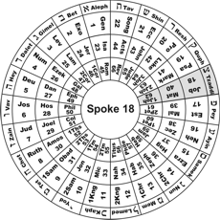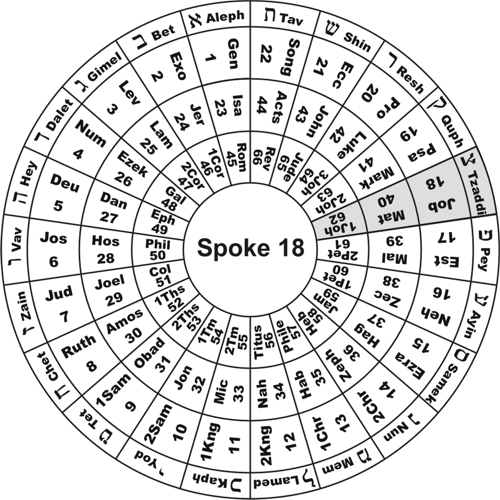To Fulfill All Righteousness
Then cometh Jesus from Galilee to Jordan unto John,
to be baptized of him. But John forbad him, saying, I have need to be baptized of thee,
and comest thou to me? And Jesus answering said unto him, Suffer it to be so now: for thus
it becometh us to fulfil all righteousness. Then he suffered him.
Matthew 3:13f (Spoke 18, Cycle 2)
The first words of the Lord Jesus Christ recorded in the Book of Matthew on Spoke 18
of the Bible Wheel perfectly
manifest the fundamental meaning the eighteenth letter Tzaddi as revealed in the KeyWord
found in the first Tzaddi verse of the great alphabetic Psalm 119:
TZADDI. Righteous art thou, O LORD, and upright are thy judgments.
Thy testimonies that thou hast commanded are righteous and very faithful.
The word translated as "righteous" is the
Tzaddi KeyWord צדק. This is discussed at length in the introduction to
Spoke 18. It seems more than a mere coincidence that the last two consonants of
this fundamental Hebrew root are also the consonants of the fundamental Greek root dikaio, the
root of δικαιοϛ (dikaios, righteous). Indeed, I am inclined to agree with the
anonymous Rabbi who declared "Coincidence is not a kosher word!"
As seen in the numerous articles on the sidebar, righteousness is a fundamental theme
that manifests on Spoke 18 of the Bible Wheel and many Inner Cycles.
This sets the tone for the Book of Matthew wherein the
Gospel of God's Righteousness first breaks forth.
This theme of Righteousness strongly differentiates the Gospel of Matthew from the other three,
as seen
by searching the Four Gospels of the KJV for all verses that contain the words righteous or righteousness:

This pattern is essentially the same in all seven English versions used for comparison in this study.
This correlation validates yet again the principle of First Occurrence. The theme established
in the first words of the Lord Jesus manifest with
perfect clarity in the content of the Gospel of Matthew and the primary meaning of the Letter Tzaddi!
Consider what this means - the geometric structure
of Scripture is integrated with the content of the sacred text! The correlation is overwhelming -
the theme
of righteousness saturates Matthew's Gospel, as seen in these representative verses:
| Righteousness in Matthew |
| Verse | Text |
| 3.14 |
And Jesus answering said unto him, Suffer it to be so now: for thus
it becometh us to fulfil all righteousness. Then he suffered him. |
| 5.6 |
Blessed are they which do hunger and thirst after righteousness: for they shall be filled.
|
| 5.10 |
Blessed are they which are persecuted for righteousness' sake: for theirs is the
kingdom of heaven.
|
| 5.20 |
For I say unto you, That except your righteousness shall exceed
the righteousness of the scribes and Pharisees, ye shall in no case enter into the kingdom of heaven.
|
| 6.33 |
But seek ye first the kingdom of God, and his righteousness; and all these
things shall be added unto you.
|
| 9.13 |
But go ye and learn what that meaneth, I will have mercy, and not sacrifice: for I
am not come to call the righteous,
but sinners to repentance.
|
| 10.41 |
He that receiveth a prophet in the name of a prophet shall receive a prophet's reward; and he that
receiveth a righteous man in the name of a righteous man shall
receive a righteous man's reward.
|
| 13.43 |
Then shall the righteous shine forth as the sun in the kingdom of their Father. Who hath ears to hear, let him hear.
|
| 21.31f |
Jesus saith unto them, Verily I say unto you, That the publicans and the harlots go into the
kingdom of God before you. For John came unto you in
the way of righteousness, and ye believed him not: but the publicans and the harlots believed him: and ye, when ye had seen it, repented not afterward, that ye might believe him.
|
| 23.35 |
That upon you may come all the righteous blood shed upon the earth,
from the blood of righteous Abel unto the blood of Zacharias son of Barachias, whom ye slew between the temple and the altar.
|
| 25.46 |
And these shall go away into everlasting punishment: but the righteous into life eternal.
|
Some of these verses have parallels in the other Gospels. Comparison
with them amplifies the mysterious emphasis of righteous in Matthew's Gospel. For example,
Matthew 6.33 says:
But seek ye first the kingdom of God, and his righteousness; and all these
things shall be added unto you.
Luke skips the reference to righteous, saying only (Luke 12.31):
But rather seek ye the kingdom of God; and all these things shall be added unto you.
Likewise, Luke 11.50f speaks only of "the blood of all the prophets ...
from the blood of Abel unto the
blood of Zacharias" whereas whereas Matthew twice includes the
adjective righteous, speaking of "righteous blood" and "righteous Abel." These are examples of a general pattern that
runs through all three synoptic Gospels - the differences are based on Alphabetic KeyWords
(see Solution to the Synoptic Problem.
Now it is very important to understand that the theme of righteousness is not constrained to Matthew's Gospel
or to Spoke 18. The fact is that righteousness also plays a central role in the themes found on Spokes 1, 19, and
20, as seen in the distribution of the all verses that contain any words relating to the roots of
"righteousness" (Hb. Tzadek or Gr. dikaio):
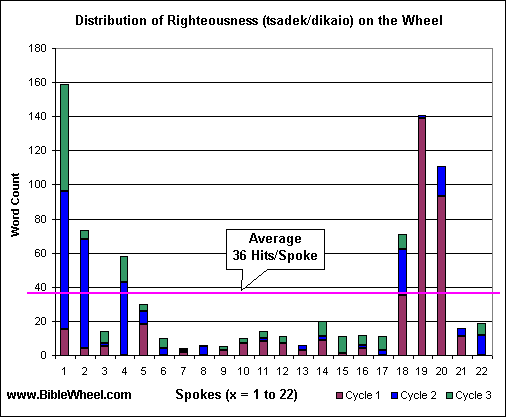
The peak on Spoke 1 reveals the integration of the theme of Righteousness with the fundamental doctrines
of Scripture, with significant contributions from each book on Spoke 1: its origin in Genesis 15.3,
the prophecy of its fulfillment in Christ Jesus in Isaiah (most
notably chapters 40, 52, 53) and the flowering - the full exfoliation - of this doctrine in Romans. A similar
threefold contribution from each book is also seen on Spoke 18. The
large contribution from Spokes 19 and 20 on Cycle 1 is different because all the hits come from
just one or two books. Here we see the the Way of Righteousness as a powerful theme in the
Wisdom Books of Job, Psalms, and Proverbs.
The relation between righteousness and the Spokes can be seen more clearly by displaying the
geometric mean
of the contributions from each Spoke. In general, this
mean is calculated by taking the nth root of the product of n numbers, so Spokes without a contribution
from all three books will have a geometric mean of zero. This therefore selects only those Spokes
with contributions from each book:
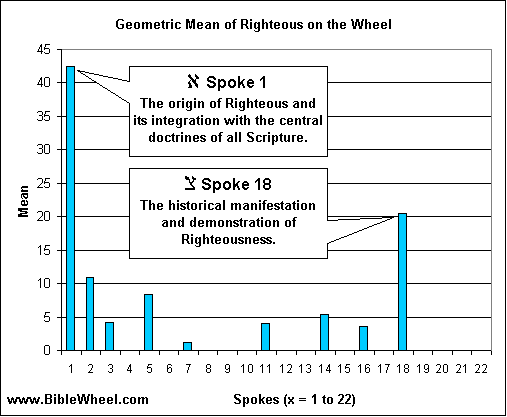
This graph reveals that righteousness is emphasized most strongly on all three Cycles of
Spokes 1 and 18. The contibutions from
Spokes 19 and 20 do not appear because they come entirely from Cycles 1 and 2.
Here we see how the great themes of Scripture are woven together. The Bible Wheel is not some trivial mechanical
repetition of a small-minded rigid rule. It is the very Work of God and so displays all the artistry
of Divine Intelligence.
Examining the distributions between Cycles 2 and 3 reveals a strong correlation, with
correlation coefficient attaining the value of .73:
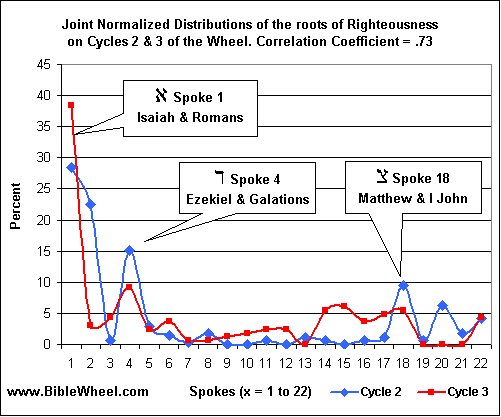
It is particularly intriguing that two
of the correlated peaks correspond to Tzaddi and Dalet, the first two letters of
צדק (Tzadek, Righteousness). All three letters corresponding to the largest peaks combine to form the first
three letters of the word אצדק (Ets'dak), meaning
I will be justified. This word appears in one and only one book of the Bible,
the Book of Job on Spoke 18, as discussed in the article Justified by thy Words.
| 